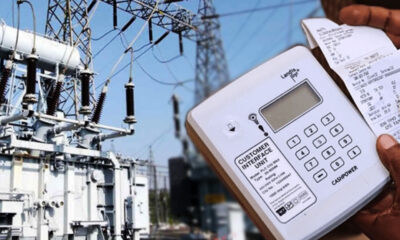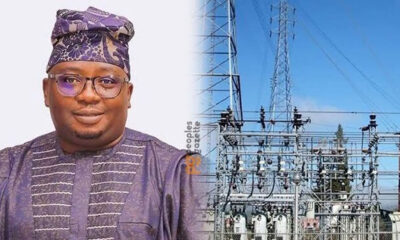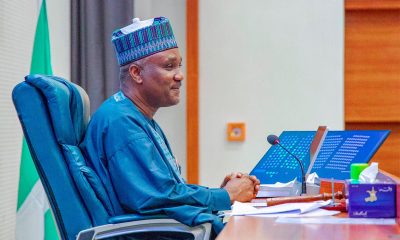News
Niger Republic in pain as Nigeria refuses to restore electricity supply weeks after coup
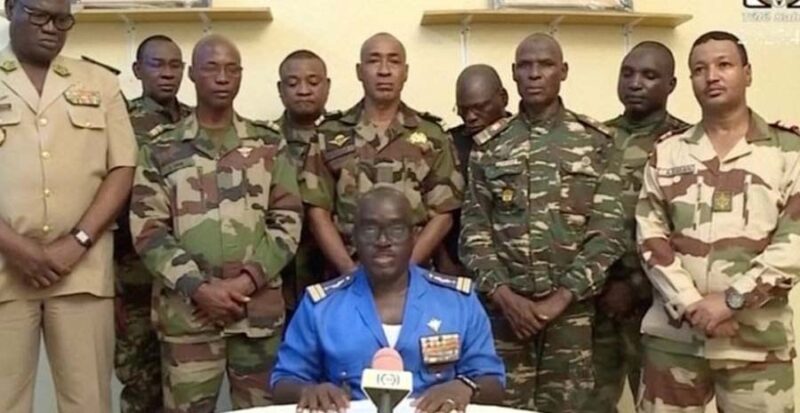
Niger Republic in pain as Nigeria refuses to restore electricity supply weeks after coup
Millions of Nigeriens are going through pain as their businesses are collapsing as a result of Nigeria’s decision to cut electricity supply to them, residents of the neighbouring country and diplomats have said.
They said hospitals are also finding it difficult to store vaccines and other essential drugs, a development that is affecting service delivery.
At present, only a few people who can afford gasoline and have generating sets, or are ready to pay for commercial electricity supply have light.
Nigeria had on August 2, 2023, disconnected the supply of 150 megawatts of electricity daily to Niger Republic as part of efforts by the Economic Community of West African States (ECOWAS) to restore democracy in the Sahel country.
Nigeria’s action was part of the regional bloc, ECOWAS sanctions imposed on Niger following the July 26 ouster of President Mohamed Bazoum by the presidential guards.
According to Nigelec, an electricity company in Niger, the development followed an emergency meeting by the ECOWAS, where sanctions, including freezing utility services, were imposed on the Niger Republic over its coup.
Niger Republic was heavily dependent on Nigeria for most of its electricity supplies.
A number of cities in that country are currently experiencing prolonged blackouts after Nigeria cut its power supply. Niamey, Maradi and Zinder are witnessing total blackouts.
This is said to be unusual in the Niger Republic, which usually enjoyed a reliable electricity supply.
Halimatou Mani, a nurse in Tsibiri, located 14 kilometres from Maradi city, said it had been tough for them since the electricity cut.
“We are not used to power outage here. What makes it worse is that very few people have power-generating sets.
READ ALSO:
-
Plot to impeach Akpabio thickens as Senators meet in Saudi Arabia
-
Shocker as Prophet impregnates friend’s wife in Ondo
-
Gov. Yusuf sacks commissioner, adviser over alleged threat to Judges
“With the action taken by Nigeria, families are suffering because it is difficult to store perishable goods,” she said.
A trader in Maradi, who gave his name as Ibrahima, said Nigeria should restore power supply to save lives.
“It should be life first before politics. Women and children are silently dying in hospitals, especially in rural areas where there is no alternative to public power supply.
“While I appeal to the junta to come down from their high horse and negotiate with ECOWAS for the sake of the people they want to rule, I am also begging ECOWAS under the leadership of Nigeria’s leader, President Bola Tinubu, for the sake of God, to consider other options of bringing back Bazoum instead of punishing all of us,” he said.
Ibrahima said businesses were collapsing, adding, “The border closure alone has caused misery to us. People are losing their sources of livelihood. I hope the bigger bloc, the African Union would find a way of resolving this problem.”
On August 19, the United Nations Children’s Fund (UNICEF) representative in Niger, Stefano Savi, warned against the severe impact of the ongoing crisis on millions of vulnerable children in the country.
“The crisis unfolding in the Republic of Niger continues to pose an ever-greater danger for millions of vulnerable children in the country.
“At present, more than two million children have been impacted by the crisis and are in desperate need of humanitarian assistance.
“Even before the recent civil unrest and political instability in Niger, estimated 1.5million children under the age of five were forecast to be malnourished in 2023, with at least 430,000 expected to suffer from the deadliest form of malnutrition. This is a figure likely to rise if food prices continue to spike and an economic downturn hits families, households and incomes,” the statement said.
Nigeria should avoid East African Nile river conflict – Ex-envoy
Speaking on Saturday, a former Nigerian ambassador to Ethiopia, Bulus Zom Lolo, said Nigeria’s decision to cut Niger off the national grid may have serious consequences on the long-time relationship between the two countries.
Lolo said that considering the complexity of the situation, Nigeria could have selected any other measure to fulfill the directive of ECOWAS without cutting the electricity supply.
READ ALSO:
-
Naira Marley mourns Mohbad, calls for probe into his death
-
PEPT’s verdict and the task before the Supreme Court – Farooq Kperogi
-
UAE official denies country lifted visa ban on Nigerians
“ECOWAS directed Nigeria to implement some measures because it is a member state. I am not sure that ECOWAS pinpointed what sanction or specific area they want Nigeria to go to. Nigeria could have selected any other measure in fulfilling the directive of ECOWAS without cutting the electricity supply,” he said.
He explained that only those in government would have clear information on why the decision to deprive Niger of electricity was taken. “But on the surface, it does look like we have opened the eyes of the people of Niger to an area they have closed their eyes on.
“Depending on how hard the electricity suspension hits the Niger populace, they may one day wake up and decide to revoke all the existing agreements and exercise their right to also construct the dam that would prevent the flow of River Niger to Kainji and Shiroro dams.
“This reminded me of the conflict in East Africa, where Ethiopia, which is sitting on the upstream end of River Nile, just like Niger that sits on the upstream end of River Niger, decided to build a dam.
“Egypt that is downstream, together with Sudan, is now making a lot of noise and has made the Ethiopia decision to build a dam a life and death affair.
“They were vehemently against Ethiopia exercising its sovereign right with a natural resource passing through their country to make good use of it. That’s the nature of diplomacy; many things can come up that you didn’t expect, and it is always dialogue.
“If it has always been the internal desire by Niger to construct a dam because they are on the upper end of River Niger, Nigeria has now given them every reason to do that,” he said.
Electricity supply to Niger is a bilateral agreement – experts
Findings revealed that Nigeria has bilateral agreements with Niger Republic on the electricity supply, paving the way for a certain percentage of power generated through the Kainji Dam to be channelled to them.
Another ex-envoy of Nigeria to Kuwait, Haruna Garba, said it was wrong for Nigeria to violate the covenant and cut off the electricity supply to the Niger Republic, even during wartime.
“One, since the Nigerian democracy is becoming stronger, it is recommended that the government should seek the advice of envoys before taking such diplomatic decisions.
“As everyone knows, there is a diplomatic reason for supplying them the power. Despite that we are compensating them for not building the dam, they are not getting it free of charge; they are paying for it.
READ ALSO:
-
5 killed as container falls on bus in Anambra
-
Popular nollywood actor loses wife
-
Again, Chicago State University confirms Tinubu graduated in 1979
“So, by cutting them off, Nigeria is depriving the Transmission Company of Nigeria (TCN) of revenue generation. How will the Nigerian government compensate them? It is not supposed to reach that extent.
“Even in wartime, you cannot deprive your enemy light, water, hospital and other essential services because if you do, virtually it is a crime.
“What I understood was that the African bloc wanted to scare the coupist but they resisted, so they shouldn’t be ashamed to retreat, it is normal in diplomacy,” he said.
Also speaking on the matter, Ilyasu Gadu, who had worked at Nigeria’s foreign service, said cutting off electricity to the Niger Republic to force the military to hand over power to President Bazoum had several implications.
“Niger was muting the idea of building a dam across River Niger, and if they did that, the volume of water that would flow down the river onto Kainji to Nigeria would be reduced,” he added.
He said President Tinubu ought to have sought the input of the National Assembly to review the treaty under the current circumstances. He advised Nigeria to look at the protocols for the sake of the future.
“In the future, looking at what Nigeria has done in Niger by unilaterally, without due process by going to the National Assembly to take a look at this thing again under the current exigencies, it means that nobody would trust any alliance, protocol or treaty in the future.
“Some Nigeriens feel that Nigeria is no longer a reliable partner, so they have started looking for other partners that will affect us. And you can imagine that in this day and age, there are other partners willing to be there for them,” he said
The diplomat said the whole impasse was not well handled by Nigeria, and described the development as a “knee-jerk’ reaction with salient ambiguity of many issues.
“Yes, we abhor the military takeover in Niger, we want democracy to be restored, but what we are doing now is like cutting our noses to spice our faces because eventually, if Niger decides to do its own pushback, we may have a lot of problems,” he said.
Niger’s 130mw underway
Speaking to Daily Trust Saturday on the matter, Boubacar Sabo, the deputy secretary-general of the Nigerien Party for Democracy and Socialism (PNDS), Tarayya, said Niger had already begun damming River Niger.
He said Niger Republic had constructed a multipurpose Kandadji dam on River Niger, with a hydropower installation capacity of 130mw (170,000 hp).
He said the Nigerien hydropower plant construction had reached an advanced stage and is billed for commissioning in the next two years.
Sabo said Niger relied on Nigeria for almost 70 per cent of its electricity requirement and may be able to cope without the supply using other means, pending the completion of their plant.
READ ALSO:
-
BREAKING : Tinubu names new CBN governor, 4 deputy govs
-
The god that cut soap for Wizkid (1)
-
FG backtracks, says no specific date for resumption of Emirates Flights
Findings by Daily Trust Saturday revealed that the Kandadji dam, cited at Tillabéri Region, 180km northwest of Niger’s capital, Niamey, would starve the supply of water to Kainji Dam, the major source of hydropower in Nigeria that left its upstream neighbour in blackout today.
Efforts to speak to the managing director/chief executive officer of the TCN, Sule Abdulaziz, an engineer, did not yield results, but a competent source in the company told our correspondent that, “Actually, the allocation to Niger is 150mw, but it fluctuates sometimes”.
Sources said both President Bazoum and his predecessor, Mahamadou Issoufou had pursued the completion of Kandadji hydroelectricity with vigour, saying they wanted to be independent of Nigeria’s electricity supply.
Shortly before his ouster, Bazoum was said to have visited the construction site of the multipurpose Kandadji dam to assess the level of work done on the site.
He was reported to have said that, “All the obstacles have been lifted and all the funding problems resolved. In a few months you will see the project taking shape.”
Findings revealed that the Niger power project had been postponed multiple times.
It was first managed by a Russian company, Zaroubegevodstroï (ZVS) before the contract was transferred to a China company, Gezhouba Group Company Limited (CGGC).
Kandadji dam construction was funded by international partners, including the World Bank, Africa Development Bank, French Development Agency and the Islamic Development Bank.
Meanwhile, an umbrella body for civil society organisations in Niger, Collective Organisations for the Defence of the Right to Energy, (CODDAE) that works toward economic and social development, technological innovation and environmental protection, has vowed to sue the Nigerian government over the latter’s power cut off to Niger.
CODDAE’s president, Malam Moustafa Khadi, told RFI Hausa that the treaty signed by both countries to provide electricity to Niger had nothing to do with ECOWAS, insisting that the treaty preludes the regional body.
“As you can all see, we are just holding this conference outdoors just because of the blackout. In this modern time, power is as the air we breathe, the water we drink. This is because all our activities have a direct link to it.
“The power cut-off has caused a lot of obstacles to our companies. Business activities that could be carried out day in and day out have been seriously disrupted. We are perfecting modalities to sue the Nigerian government in court. Nigeria must be held responsible and made to reimburse all the damages caused by its handiwork,” he said.
Niger Republic in pain as Nigeria refuses to restore electricity supply weeks after coup
(DAILY TRUST)
News
Tinubu Rejects Calls to Suspend New Tax Laws, Insists Reforms Will Proceed

Tinubu Rejects Calls to Suspend New Tax Laws, Insists Reforms Will Proceed
President Bola Tinubu has rejected calls to suspend the implementation of Nigeria’s new tax laws, insisting that no substantial issue has been established to justify halting the reform process.
In a statement personally signed on Tuesday, Tinubu affirmed that the tax reform laws, including those that took effect on June 26, 2025, and others scheduled to commence on January 1, 2026, will be implemented as planned.
“No substantial issue has been established that warrants a disruption of the reform process,” Tinubu said. “Absolute trust is built over time through making the right decisions, not through premature, reactive measures.”
The president’s position comes amid growing public debate over alleged discrepancies between the tax acts passed by the National Assembly and versions published in the Official Gazette.
On December 26, the National Assembly ordered a re-gazetting of the tax laws after acknowledging differences between the legislative versions and the published documents. In separate statements, the House of Representatives spokesman, Akin Rotimi, and the Clerk to the National Assembly, Kamoru Ogunlana, assured Nigerians that the matter was being addressed within constitutional and statutory limits.
READ ALSO:
- Two Close Aides of Anthony Joshua Identified as Victims of Fatal Crash
- Court Orders Accelerated Hearing of Suit Challenging 2025 Tax Acts, Declines Injunction
- Sophia Momodu Asks Fans to Stop Calling Her Davido’s Wife
They explained that the review was being conducted in line with the 1999 Constitution, the Acts Authentication Act, and established parliamentary practice, stressing that the exercise was purely administrative and did not suggest any defect in legislative authority.
“This administrative action is intended solely to authenticate and formally reflect legislative decisions,” the statements said, adding that certified true copies would be made available to stakeholders and the public.
However, former Vice President Atiku Abubakar described the situation as “a grave constitutional issue,” arguing that any law published in a form not passed by the National Assembly amounts to a nullity.
“A law that was never passed in the form in which it was published is not law,” Atiku said, warning that any post-passage alteration without legislative approval would constitute a constitutional breach.
Despite the controversy, President Tinubu, who is currently on vacation in Europe, reiterated his administration’s commitment to due process and pledged continued collaboration with the National Assembly to resolve any outstanding issues.
“These reforms are a once-in-a-generation opportunity to build a fair, competitive, and robust fiscal foundation for our country,” Tinubu stated, adding that the new laws are aimed at harmonisation, structural reset, and strengthening the social contract, not increasing tax burdens.
The affected legislations include the Nigeria Tax Act 2025, Nigeria Tax Administration Act 2025, Joint Revenue Board of Nigeria (Establishment) Act 2025, and the Nigeria Revenue Service (Establishment) Act 2025.
Tinubu urged stakeholders to support the implementation phase, which he described as firmly in the delivery stage, assuring Nigerians that the reforms are designed to promote prosperity and shared responsibility.
Tinubu Rejects Calls to Suspend New Tax Laws, Insists Reforms Will Proceed
News
NAF Bombards Lakurawa, Bandit Camps in Zamfara after US airstrike

NAF Bombards Lakurawa, Bandit Camps in Zamfara after US airstrike
In a major escalation of counterterrorism operations across the North-West, the Nigerian Air Force (NAF) has carried out devastating precision airstrikes on notorious bandit enclaves in Zamfara State, coming on the heels of United States missile strikes that crippled Lakurawa terrorist camps in Sokoto.
The Air Component of Operation Fansan Yamma, Sector 2, executed two high-impact air interdiction missions at Turba Hill and the camp of feared bandit leader, Kachalla Dogo Sule, both located in Tsafe Local Government Area of Zamfara State. Several bandits were neutralised, while key operational facilities were destroyed.
Director of Public Relations and Information of the NAF, Air Commodore Ehimen Ejodame, described the strikes as a significant breakthrough in the sustained offensive against armed banditry.
He said the operations were intelligence-driven, relying on credible, multi-source intelligence and persistent surveillance. The first strike targeted Turba Hill, identified as a major bandit hideout. According to Ejodame, aerial reconnaissance revealed intense human activity and a zinc-roofed structure serving as the nerve centre of the enclave.
“Following positive identification, the target was engaged with precision. Post-strike assessments confirmed the complete destruction of the structure and the neutralisation of several bandits,” he said.
The second mission struck Kachalla Dogo Sule’s Camp, a notorious stronghold linked to the manufacture and deployment of improvised explosive devices (IEDs). Intelligence reports had connected the camp to recent deadly IED attacks along the Dan Sadau–Magami axis.
“The precision strike triggered intense fires that destroyed multiple active structures, effectively crippling the group’s IED production and operational capacity,” Ejodame added.
He noted that the airstrikes had significantly degraded bandit networks in Zamfara and reaffirmed the NAF’s commitment, in collaboration with other components of Operation Fansan Yamma, to denying criminal elements safe havens and restoring lasting peace across the North-West.
Army Confirms US Missile Strikes on Sokoto Terror Camps
Meanwhile, the Nigerian Army has confirmed that recent United States airstrikes targeted Lakurawa terrorist camps in Tangaza Local Government Area of Sokoto State, delivering a heavy blow to the group’s operational capability.
A senior Army Headquarters source disclosed that the strikes were conducted in coordination with US Africa Command (AFRICOM) following actionable intelligence on terrorist movements along the Kaurau axis. The missile strikes hit camps in the Bauni Forest near Waria and Alkassim villages on December 25.
Follow-up patrols carried out the next day confirmed extensive destruction of terrorist infrastructure. Troops later recovered missile debris in Kajiji town, Tambuwal LGA, Kebbi State, believed to be components of Tomahawk missiles.
Army engineers identified some of the debris as fuel boosters weighing about 300 kilograms, capable of penetrating soft ground up to two metres. The Army assured residents that investigations and recovery operations were ongoing and urged the public to report any suspicious objects.
Eight Killed as Terrorists Attack Kebbi Communities
Despite the military gains, terror struck Kebbi State as gunmen launched coordinated attacks on Kaiwa, Gelawu and Gebbe villages in Shanga Local Government Area, killing at least eight people and injuring several others.
The Kebbi State Police Command confirmed that seven victims died during the attacks, while another later succumbed to injuries in hospital. One injured person is currently receiving treatment.
Police spokesperson, CSP Bashir Usman, said security forces had intensified patrols and surveillance across the affected areas to prevent further attacks, though details of ongoing operations could not be disclosed.
Residents described the assaults as unprecedented and devastating, forcing many villagers to flee their homes in fear.
Troops Kill 80 Terrorists, Rescue 34 Victims Nationwide
In a broader update, the Nigerian Army announced that troops killed over 80 terrorists, rescued 34 kidnapped civilians and arrested several criminal suspects in coordinated operations across multiple states between December 25 and 29.
The operations spanned Borno, Adamawa, Sokoto, Katsina, Niger, Zamfara, Plateau, Delta, Cross River and the Federal Capital Territory.
In Borno State, air and ground offensives neutralised 57 terrorists and disrupted ISWAP/JAS networks, while operations in Niger and Katsina repelled coordinated attacks and recovered stolen livestock.
Troops also rescued kidnapped civilians in Kebbi and Plateau states, arrested illegal miners in the FCT, apprehended armed robbery suspects, and dismantled oil bunkering and piracy syndicates in Delta and Cross River states.
The Army said the successes underscore its resolve to sustain intelligence-driven operations, protect lives and property, and dismantle terrorist and criminal networks across the country.
News
Sokoto Operation: FG Reassures Investors, Says Nigeria’s Economy Remain Stable

Sokoto Operation: FG Reassures Investors, Says Nigeria’s Economy Remain Stable
The Federal Government has reassured investors, financial analysts, and international development partners that Nigeria remains peaceful, stable, and economically resilient despite concerns following a joint security operation in Sokoto carried out on Christmas Day.
The Minister of Finance and Coordinating Minister of the Economy, Wale Edun, gave the assurance in a statement issued on Sunday in Abuja, explaining that the operation—conducted in collaboration with the United States—was a targeted, intelligence-led action aimed solely at terrorist elements threatening national security and economic activities.
“What Nigeria is decisively confronting—alongside trusted international partners—is terrorism,” Edun said, stressing that the context of the operation was essential to understanding its broader economic implications.
He described the Sokoto operation as “precise, intelligence-led, and focused exclusively on terrorist elements that threaten innocent lives, national stability, and economic activity,” adding that the action was designed to strengthen security rather than unsettle financial markets or undermine investor confidence.
“Far from destabilising markets or weakening confidence, such actions strengthen the foundations of peace, protect productive communities, and reinforce the conditions required for sustainable economic growth. Security and economic stability are inseparable; every effort to safeguard Nigerians is, by definition, pro-growth and pro-investment,” the minister said.
READ ALSO:
- Ibadan Explosion: Fayose Releases Documents, Claims Makinde Got ₦50bn from FG
- Italy Arrests Nine Over €7M Hamas Funding Network, Seizes €8M in Assets
- Kennedy Center Sues Musician for $1M Over Trump Name Cancellation
Edun noted that under the leadership of President Bola Ahmed Tinubu, Nigeria has recorded measurable progress in security improvements and economic reforms, reflected in key macroeconomic indicators.
According to him, Nigeria’s GDP grew by 3.98 per cent in Q3 2025, following a strong 4.23 per cent growth in Q2, with expectations of an even stronger performance in Q4 2025. He added that inflation has slowed for the seventh consecutive period and now stands below 15 per cent, attributing the improvement to coordinated fiscal and monetary policies.
The minister said Nigeria’s financial markets remain stable, with both domestic and international debt markets functioning efficiently under prudent fiscal management. He recalled that the country recently secured credit rating upgrades from Moody’s, Fitch, and Standard & Poor’s, describing them as independent validation of the government’s reform agenda.
“We have maintained fiscal discipline, prioritised efficiency, and protected macroeconomic stability, demonstrating resilience in the face of external shocks,” Edun said.
Referring to President Tinubu’s recent national address, Edun stated that the administration’s focus for 2026 is to consolidate gains made in 2025, strengthen economic resilience, and sustain momentum toward inclusive and durable growth.
Assuring local and foreign investors ahead of market reopening on Monday, December 29, 2025, Edun said confidence in Nigeria’s economic direction remains justified.
“As markets reopen, investors can be confident that Nigeria remains reform-driven, stable, and focused on growth. The fundamentals are strengthening, the policy direction is clear, and this administration’s resolve to protect lives and secure prosperity is unwavering,” he said.
He concluded by reaffirming the country’s investment outlook: “Nigeria remains open for business, anchored in peace, and firmly focused on the future.”
Sokoto Operation: FG Reassures Investors, Says Nigeria’s Economy Remain Stable
-
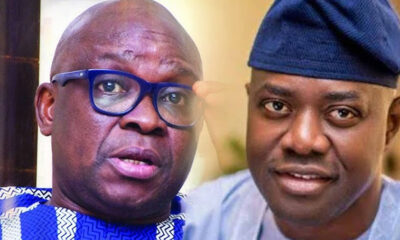
 metro2 days ago
metro2 days agoIbadan Explosion: Fayose Releases Documents, Claims Makinde Got ₦50bn from FG
-

 metro2 days ago
metro2 days agoNiger Delta Crackdown: Army Seizes ₦150m Stolen Oil, Arrests 19 Suspects
-
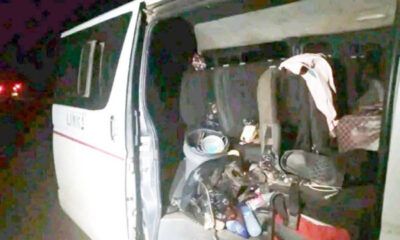
 metro2 days ago
metro2 days agoPlateau Kidnappers Demand ₦1.5m Each as 28 Muslim Travellers Remain in Captivity
-

 Sports2 days ago
Sports2 days agoCristiano Ronaldo Wins Best Middle East Player at 2025 Globe Soccer Awards in Dubai
-
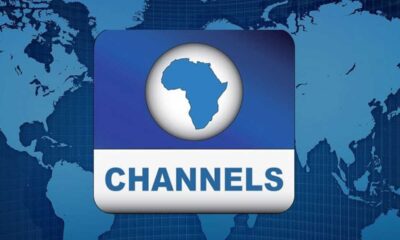
 Opinion3 days ago
Opinion3 days agoHow a Misleading Channels TV Headline Reignited Nigeria’s Religious Tensions
-

 Sports2 days ago
Sports2 days agoAnthony Joshua injured as two die in fatal Lagos-Ibadan Expressway crash (plus photos)
-

 metro3 days ago
metro3 days agoNigerian Army Kills 438 Boko Haram, ISWAP Terrorists in Seven Months
-

 metro2 days ago
metro2 days agoBello Turji Not Killed in US Airstrikes, Security Expert Debunks Reports



